In November of 1987 I was confronted with a tragedy of epic proportions when I learned that sixteen of my dearest friends had been massacred on a peace and reconciliation project we were deeply involved with in the African nation of Zimbabwe. Even years later, it is hard to write about because very few if anyone understands the depth of what really happened and the far-reaching consequences both personally and nationally. Those with knowledge of the situation in Zimbabwe have commented to me, had the community survived, the trajectory of the nation might have been strikingly different.
This racially integrated community was in my view, the purest expression of true Christianity as Jesus taught it I have ever had the privilege of witnessing. It was birthed out of the passion of a few former Rhodesian soldiers and their families who had lived through the unspeakable horrors of civil war and later been genuinely converted to the teachings of Jesus. In discovering the simple life-giving words calling us to “love our enemies,” they decided to do just that and were soon living it out on a daily basis. This was the untainted Good News (Gospel) in action, radically transforming lives, truly redeeming the culture and even being expressed in healing the land itself through holistic agricultural projects. They had no church building, no man they called “pastor”, they didn’t hold traditional church services, they were a living community where the life of Jesus was the center and substance of all they did. Words do not do justice to what I had the joy of seeing lived out! It was truly transformational.
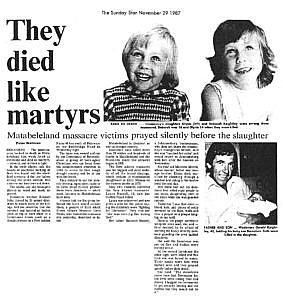 And in one bloody, treacherous night, all that I knew and held dear was utterly and brutally destroyed. Everyone I loved, and everything I had hoped in, was either dead or burned to the ground! And I was left with the task of picking up the pieces, except there were few if any pieces left. In the modern world of institutional religion with its formulaic-driven culture, the “good things happen to good people and bad things happen to bad people” formula crumbled while holding it in my hands. I stood there as the ashes of my vision for peace fell between my fingers, and the only things left were a deep sense of unspeakable loss, overwhelming injustice, and utter powerlessness to do anything about it, let alone make sense of it all. It was a horrible moment that no one should ever experience!
And in one bloody, treacherous night, all that I knew and held dear was utterly and brutally destroyed. Everyone I loved, and everything I had hoped in, was either dead or burned to the ground! And I was left with the task of picking up the pieces, except there were few if any pieces left. In the modern world of institutional religion with its formulaic-driven culture, the “good things happen to good people and bad things happen to bad people” formula crumbled while holding it in my hands. I stood there as the ashes of my vision for peace fell between my fingers, and the only things left were a deep sense of unspeakable loss, overwhelming injustice, and utter powerlessness to do anything about it, let alone make sense of it all. It was a horrible moment that no one should ever experience!
Disillusioning? It was a train wreck and in that moment I found myself emotionally bruised, bleeding and disorientated. I still haven’t found the right words to explain that season of my life and possibly never will. Would you believe that wasn’t the end of it. A couple years after the catastrophe, having relocated to a different city to be involved in a new church community, I was asked at a gathering of people to stand up and tell them a bit about myself. In the course of my sharing, I mentioned the reconciliation project in Zimbabwe and the death of my friends. In my mind they were worthy of being talked about. They had paid the ultimate price, laid down their lives for the good of others, for their dedication to a cause—they were modern day martyrs. While telling the story, from the back of the room someone shouted out “Bummer man, we don’t want to hear about people dying!” Those words were like a spear piecing my most vulnerable emotions. I was able collect myself, keep my composure and finish what I had to say but the damage was done. It was the last time I talked about the situation for the next seventeen years.
DOES ANYONE CARE?
That painful encounter became somewhat emblematic of my journey over the years, as I wrestled with the reality of why so few people wanted to hear or talk about what had happened. It made them distinctly uncomfortable; and it left me completely confused. It was a lonely road to walk feeling imprisoned with a great many unresolved thoughts. Does anyone care I asked myself? Does anyone see value or meaning in their sacrifice I wondered? What has happened within the church world whereby people no longer want to hear about a way of life where personal sacrifice is involved? It was not long ago when John Foxe’s Book of Martyrs was still considered a book to be revered by those within the Christian community. In fact, early Christians believed that martyrs received a special reward. After all, Jesus said there was no greater love than to lay your life down for your brother! (John 15:13) When did love become so self-centered? Did love go through a metamorphosis at some point? I’ve always been struck by the complete lack of focus on “self” in Paul’s description of love in his letter to the community in Corinth. (I Cor. 13) Something significant has happened in our culture and love has taken on a distinctly different focus.
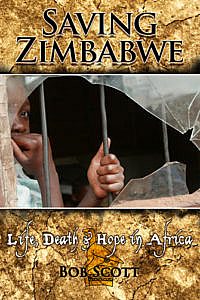 In 2007, concerned the story was going to be lost and the world would never know what an extraordinary mission they had set out on, I decided to tell their story and wrote “Saving Zimbabwe: Life, Death & Hope in Africa”. It proved to be profoundly cathartic for me, but upon completion of the manuscript, I was again confronted by the fact that no one in the American Christian Publishing industry seemed interested in publishing their story. After visiting a number of Christian bookstores I began to better understand why.
In 2007, concerned the story was going to be lost and the world would never know what an extraordinary mission they had set out on, I decided to tell their story and wrote “Saving Zimbabwe: Life, Death & Hope in Africa”. It proved to be profoundly cathartic for me, but upon completion of the manuscript, I was again confronted by the fact that no one in the American Christian Publishing industry seemed interested in publishing their story. After visiting a number of Christian bookstores I began to better understand why.
A quick scan of the top ranked bestsellers in the front of each store revealed a rather startling observation; other than a couple biographies, virtually every other book was a process or formula for how to get God’s material blessings. The clear priority for most was either how do I get more stuff from God or how can I feel better about myself!
Out of curiosity, I asked the woman at the checkout if they had any copies of Foxe’s Book of Martyrs. She had no idea; she had never heard of the book. The database indicated there was one copy in their system somewhere in the back of the store, but when my wife and I checked the shelves, we couldn’t find it. Only after an exhaustive search, did we happen upon a discombobulated stack of books on a lower shelf in the back of a dusty display. There in the forgotten stack was the elusive book telling the stories of so many heroic people who had died for their faith. The irony of this moment was not lost on me as it felt like one of those eerie compelling commentaries on our culture.
So what has happened? How did we get here? When did our understanding of Christianity shift from this being all about what we do for others to what’s in it for me? Where did this “It’s All About Me” culture come from?
WHO IS INFLUENCING WHO?
 From the very onset of Christianity, which is supposed to be based on the teachings of Jesus, part of the mission has been influencing the non-Christian world with those principles he taught. In hindsight, it would be fair to say our report card has mixed results. Over time, as institutionalism replaced organism (the living community of Jesus followers), the goals of the church turned inward and the preservation of land, wealth, power and influence dominated its culture. The conservation of the institutional church became paramount and the end justified the means. Things turned ugly and corruption raised its deformed head. In time one couldn’t tell the difference between where the civil state government ended and the institutional church world began. It was a marriage of convenience, a consolidation of power and influence, which spawned some terrible offspring. Love got left behind on the way and became orphaned.
From the very onset of Christianity, which is supposed to be based on the teachings of Jesus, part of the mission has been influencing the non-Christian world with those principles he taught. In hindsight, it would be fair to say our report card has mixed results. Over time, as institutionalism replaced organism (the living community of Jesus followers), the goals of the church turned inward and the preservation of land, wealth, power and influence dominated its culture. The conservation of the institutional church became paramount and the end justified the means. Things turned ugly and corruption raised its deformed head. In time one couldn’t tell the difference between where the civil state government ended and the institutional church world began. It was a marriage of convenience, a consolidation of power and influence, which spawned some terrible offspring. Love got left behind on the way and became orphaned.
While we are tempted to focus all of our attention on this time period once called “The Dark Ages”, the same dynamic can be clearly seen at work in the pages of the Old Testament. The corruption of institutional religion first reached its apex during the time of Samuel when his sons Hophni and Phinehas were found to be stealing from the offerings and sleeping with the women serving in the Tabernacle. (1 Samuel 2) The growing distrust of religious leaders, gave rise to Israel’s longing to be like the other nations, and the people’s seeking for a new champion, their demanding a king. You might say this was perhaps the first request for a separation of power between the church and state ushering in the advent of the Israelite monarchy. The “separation” ended up being short lived as we see Saul, the nation’s first king, already slaughtering the priests who he felt were disloyal. (1 Samuel 22) Over time, as the kings went, so the priests followed. As various kings tried to prevent the stronger nations from raiding them by paying tributes, in embracing their alliances of convenience they also adopted pagan gods, some being set up in the very temple Solomon built.
So why do I bring this up? Because from the beginning of time there has been a continual struggle of who is influencing who. While Christians desire to impact the culture for its betterment, too often it’s the other way around. In keeping with the proverbial frog in the kettle, sometimes these influences are gradual over time and we have to stop at some point and ask how we got here.
Stay tuned! In Part II I will address the post-World War II sociological influences which transformed our national cultures and shifted our focus away from others while making it “All About Me!” The Christian community was not immune from this seismic cultural shift and is now beset by a new normal.
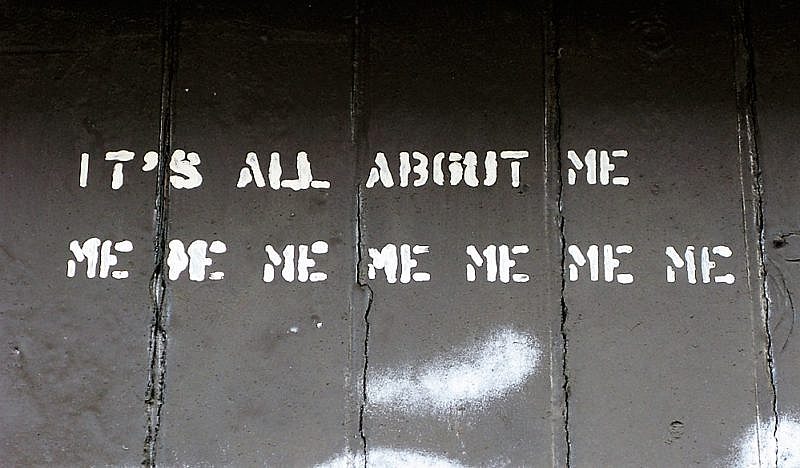


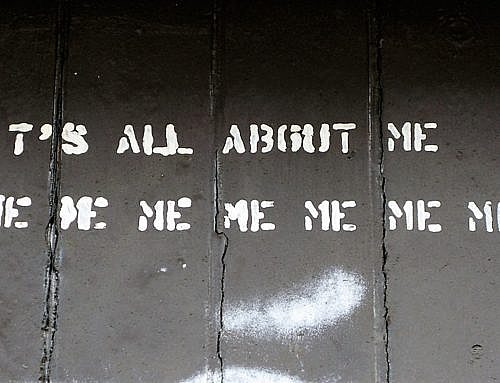
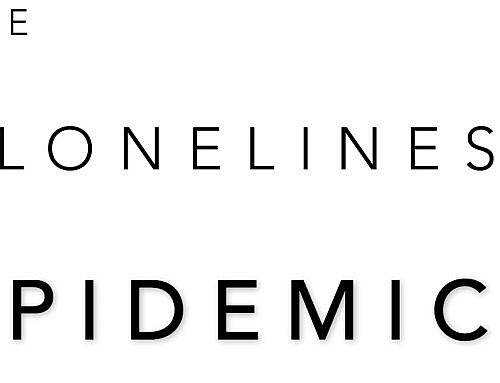

Leave A Comment